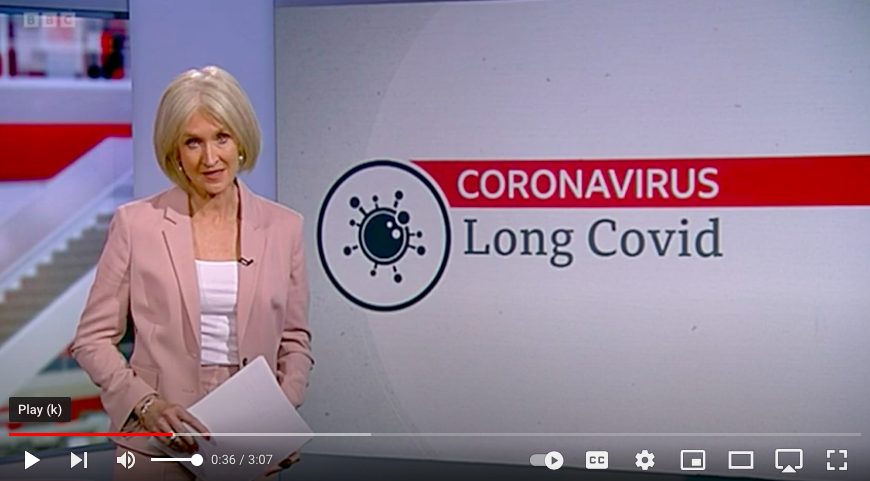|
|
|
The
UK phytochemical rich food and probiotic,
covid virus
intervention study
National
ethics (IRAS): 282517 |
|
The non-commercial and indenpendentally audited analysis, which recruited from May-Dec 2020, was designed and conducted by a team of dedicated clinical and academic nutritionists, chest physicians, research pharmacist, consultants and scientists from Bedfordshire and Addenbrooke’s Cambridge University Hospitals. It was the World’s largest nutritional intervention study involving men and women with symptomatic covid-19 infection and attracted substantial academic and media attention (see below). The first part of the analysis This involved 126 patients with symptomatic covid and looked at the impact of the probiotic now know as Yourgutplus+ The data was analysed as a whole and then subdivided into 40 (32%) in an early phase of infection (average symptoms 10 days before baseline) and the 86 (68%) in a chronic phase (average symptoms 120 days before trial baseline). Cough, fatigue and overall well-being scores all significantly improved both the early and chronic phase cohorts.
The scientific committee of the journal concluded that although some participants with early disease would have improved spontaneously, such a rapid improvement in the majority who had been experiencing symptoms for over 6 months, was clinically relevant and welcomed, especially among those more likely to have pre-existing gut dysbiosis.
Read a summary of the trail results and download full first paper)
|
|
This involved 151 participants and analysed the impact of symptoms and outcomes after covid of the nutritional capsule now known as Phyto-V Participants were randomised to receive the ingredients of the phyto-V capsule in addition to the Yourgutplus+ capsule or a placebo (blinded so they did not know what they were taking). In addition to the benefit already received from the probiotic, there was a further 3 fold reduction in symptoms amoung participants who took phyto-v as opposed to placebo.. Read a summary of the trail results and download full second paper)
|
|
Future Research A further study has now been ethically approved and will evaluate whether this probiotic/prebiotic blend with Vitamin D3 could enhance antibody titres post covid vaccine. It will recruit 200 participants who a due for their covid booster vaccine. It will measure symptoms post vaccination, antibody titres (markers of success) and record post vaccine infection rates. |
|
Background and rationale for the study Treatments for covid-19 aim to support symptoms, secondary infection and thrombosis and ultimately to reduce the fatal cytokine storm. Although anyone can be affected by covid-19, data collected from hospitals across the world are showing that people with pre-existing health conditions or who are overweight are more vulnerable to the complications of infection and one possible explanation for this is a pre-existing poor gut health which could lead to a pro-inflammatory state. Phytochemical rich concentrated foods are safe, can be developed rapidly and are ubiquitously available. Phytochemicals are naturally responsible for the colour, taste and aroma of foods. Their regular intake has been found to have multiple health benefits particularly reducing chronic degenerative disease and reducing excess chronic inflammation. Their biological mechanisms of action range from improving immune and oxidative capacity and efficiency to improving bacterial gut health. Laboratory studies investigating of a wide range of herbs and plants have also reported potential direct anti-viral properties via reduced viral attachment, penetration and absorption proliferation and shedding which in theory. If these benefits are extrapolated to humans to reduce the chase of catching the virus, suffering from it or spreading it to other people virus. Probiotic supplements have also been reported to enhance gut flora, reducing chronic gut inflammation and improving gut wall integrity especially among individuals with preexisting health conditions or have diets high in sugar and meat and low in fruit and vegetables. A Cochrane review concluded probiotic capsules could reduce respiratory tract infections.It is important that probiotics are sources from GMP registered manufacturers and contain a wide spectrum of colony forming lactobacillus. The phytochemicals particularly the polyphenol group, which show
promise and are found in common foods include: The flavanone polyphenol
hesperetin found in citrus fruits; Quertin, a flavonoid found in, onions, apple, pomegranate and citrus
fruits; Apigenin a polyphenol found
in parsley, chamomile, tea and fruit. Curcumin curcuminoids found in ellagic
acid found in pomegranate. Certification, MHRA and legal considerations: This trial was sponsored by Bedfordshire NHS trust and designed by an international team of oncologist, intuitionalists and patients listed listed in the scientific committee. The national study was formally externally peer reviewed. It was registered and approved the National Ethics Committee, and registered by the National Institute of Health Research (NIHR). It was formally notified as a non-drug intervention by the Medicines and Health Regulatory Agency (MHRA). Chief
investigator: |








